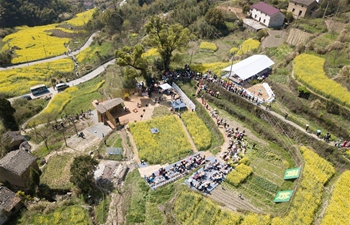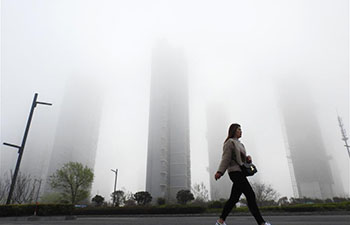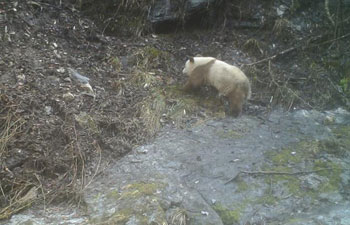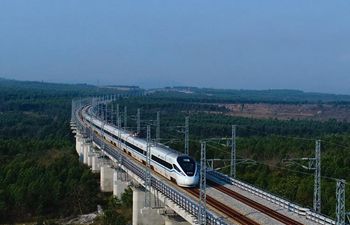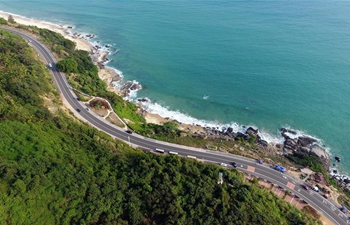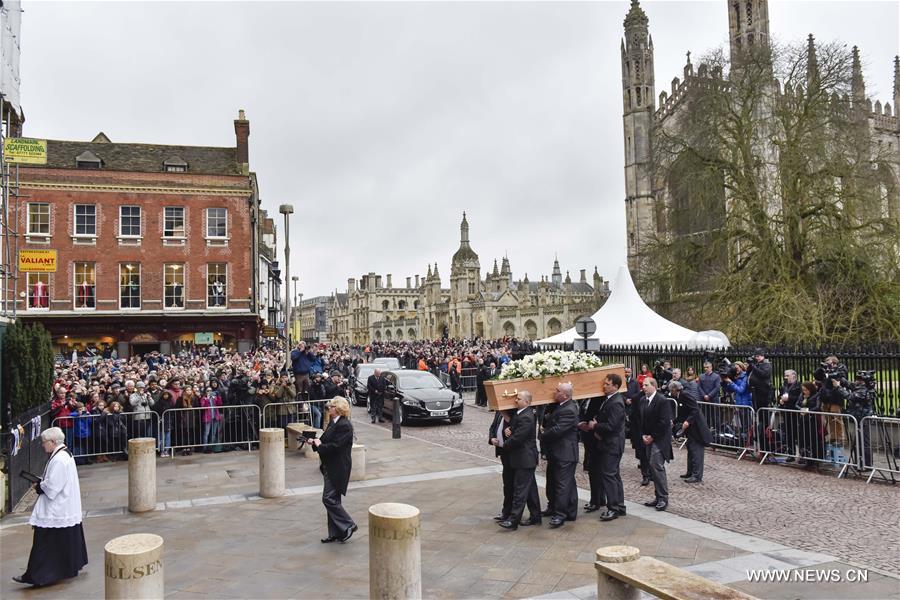
The coffin of British physicist Stephen Hawking is carried into the Great St Mary's Church in Cambridge, Britain, on March 31, 2018. The funeral of Professor Stephen Hawking was held Saturday at a church near the Cambridge University college where he was a fellow for more than half a century. (Xinhua/Stephen Chung)
by Xinhua Writers Jin Jing, Gu Zhenqiu, Zhang Jiawei
CAMBRIDGE, Britain, March 31 (Xinhua) -- The drizzle kept falling. Cambridge seemed to be weeping as thousands of citizens and visitors gathered on Saturday in respectful mourning silence outside the university church, Great St May's.
Up to 500 families members, friends and colleagues attended the private funeral service after the legendary British physicist professor Stephen Hawking's coffin was carried through Cambridge's main King's Parade street into the church.
The solid oak coffin, carried by by six porters all in formal black uniform, was covered by an arrangement of white lilies, which represent the universe, and white roses symbolizing the polar star.
The private service, officiated by the Reverend Dr Cally Hammond, Dean of Gonville and Caius College, Hawking's academic home, was described as "both inclusive and traditional, reflecting the breadth and diversity of his life," according to a statement by Hawking's children.
Also among those inside the church was Eddie Redmayne, who played the role of professor Hawking in the 2014 biographical drama The Theory of Everything.
Great St Mary's Church dates back to the 13th century, almost as old as Cambridge University itself. The church bell, considered the model for the Big Ben in London, chimed 76 times ahead of the funeral at around 1400 GMT to remember the great scientist who died at home on March 14 at the age of 76.
On the streets of Cambridge, the outpouring love and sorrow for Hawking's death are heart-felt and genuine.
Karen Smart, a Cambridge alumna, drove all the way from Suffolk, a city about 80 km east of Cambridge. She and her husband have been waiting outside the church since Saturday morning.
"I will never see someone like Professor Hawking in my life time again. He is such an intelligent and compassionate person," Smart told Xinhua, "That's why I feel that I need to be here to pay my respect."
Professor Alexander Boksenberg, honorary professor of Experimental Astronomy at University of Cambridge, have known Hawking when the latter was a doctoral student at Cambridge.
"He (Hawking) was very friendly and remained so to everyone through the electronic means possible to him for the rest of his difficult physical life," Boksenberg said.
Boksenberg, also former director of the Royal Greenwich Observatory, became Hawking's next door neighbor for a year when he moved to Cambridge in 1990.
"Hawking was possessed with a brilliant intellect coupled with a deep concern for humanity in the world. This enabled him to rise above his dreadful motor neurone disease and become one of the most famous scientists in the world," Boksenberg said.
A legendary figure in the modern history of physics, Hawking is known for his work with black holes and relativity, despite being bound to wheelchair after contracting a motor neurone disease in 1963 at the age of 21.
He broke new ground on the basic laws which govern the universe, including the revelation that black holes have a temperature and produce radiation, now known as Hawking radiation.
Meanwhile, Hawking sought to explain many of these complex scientific ideas to a wider audience through popular books, most notably his bestseller A Brief History of Time.
In the highest honor of his achievements, Hawking's ashes will be interred at Westminster Abbey in London near the remains of Isaac Newton and Charles Darwin on June 15. In a statement, Cambridge University described Hawking as" an inspiration to millions."
Mei Jianjun, director of the Needham Research Institute in Cambridge, told Xinhua that rarely had a scientist been so effectively engaged with the public as professor Hawking.
"The inspiration and encouragement given by professor Hawking went beyond the scientific field. Maybe not many people understand Hawking radiation, but because of Hawking, people feel so close to the universe and science," said Mei.
Great St Mary's church is just a stone's throw away from Gonville and Caius, the Cambridge College where Professor Hawking was a fellow since 1965. Flowers of tribute are overflowing outside and the college flag has been flying at half-mast since Hawking's death.
More than three thousand people have visited Gonville & Caius College to sign a book of condolence, which the college said will be eventually presented to Hawking's family. An online version of the book also gathered thousands of messages from well-wishers all over the world.
Some of them said their lives were inspired and even changed by Hawking, who once said: "however difficult life may seem, there is always something you can do, and succeed at."
Chris Warnes, a visitor who just signed the book placed beside a picture of Hawking in the porters' lodge of the college, said Hawking has taught him never to give up.
"Thanks to Hawking, I will always remain curious about life and remember to look up at the stars," he said.





